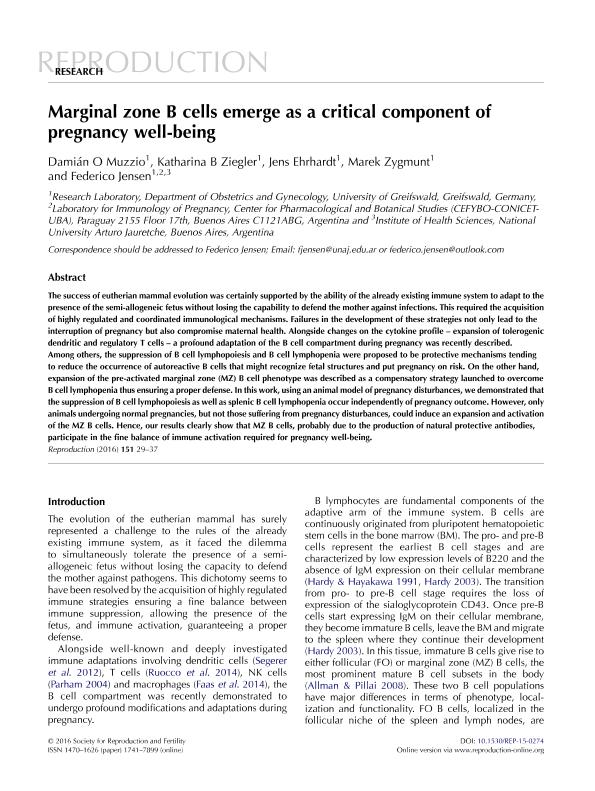Mostrar el registro sencillo del ítem
dc.contributor.author
Muzzio, Damián Oscar

dc.contributor.author
Ziegler, Katharina B.

dc.contributor.author
Ehrhardt, Jens

dc.contributor.author
Zygmunt, Marek

dc.contributor.author
Jensen, Cristian Federico

dc.date.available
2017-06-07T22:13:52Z
dc.date.issued
2015-10
dc.identifier.citation
Muzzio, Damián Oscar; Ziegler, Katharina B.; Ehrhardt, Jens; Zygmunt, Marek; Jensen, Cristian Federico; Marginal zone B cells emerge as a critical component of pregnancy well-being; BioScientifica; Reproduction; 151; 10-2015; 29-37
dc.identifier.issn
1470-1626
dc.identifier.uri
http://hdl.handle.net/11336/17735
dc.description.abstract
The success of eutherian mammal evolution was certainly supported by the ability of the already existing immune system to adapt to the presence of the semi-allogeneic fetus without losing the capability to defend the mother against infections. This required the acquisition of highly regulated and coordinated immunological mechanisms. Failures in the development of these strategies not only lead to the interruption of pregnancy but also compromise maternal health. Alongside changes on the cytokine profile - expansion of tolerogenic dendritic and regulatory T cells - a profound adaptation of the B cell compartment during pregnancy was recently described. Among others, the suppression of B cell lymphopoiesis and B cell lymphopenia were proposed to be protective mechanisms tending to reduce the occurrence of autoreactive B cells that might recognize fetal structures and put pregnancy on risk. On the other hand, expansion of the pre-activated marginal zone (MZ) B cell phenotype was described as a compensatory strategy launched to overcome B cell lymphopenia thus ensuring a proper defense. In this work, using an animal model of pregnancy disturbances, we demonstrated that the suppression of B cell lymphopoiesis as well as splenic B cell lymphopenia occur independently of pregnancy outcome. However, only animals undergoing normal pregnancies, but not those suffering from pregnancy disturbances, could induce an expansion and activation of the MZ B cells. Hence, our results clearly show that MZ B cells, probably due to the production of natural protective antibodies, participate in the fine balance of immune activation required for pregnancy well-being.
dc.format
application/pdf
dc.language.iso
eng
dc.publisher
BioScientifica

dc.rights
info:eu-repo/semantics/openAccess
dc.rights.uri
https://creativecommons.org/licenses/by-nc-sa/2.5/ar/
dc.subject
B Cells
dc.subject
Pregnancy
dc.subject
Tolerance
dc.subject.classification
Inmunología

dc.subject.classification
Medicina Básica

dc.subject.classification
CIENCIAS MÉDICAS Y DE LA SALUD

dc.title
Marginal zone B cells emerge as a critical component of pregnancy well-being
dc.type
info:eu-repo/semantics/article
dc.type
info:ar-repo/semantics/artículo
dc.type
info:eu-repo/semantics/publishedVersion
dc.date.updated
2017-06-07T20:28:47Z
dc.identifier.eissn
1741-7899
dc.journal.volume
151
dc.journal.pagination
29-37
dc.journal.pais
Reino Unido

dc.journal.ciudad
Bristol
dc.description.fil
Fil: Muzzio, Damián Oscar. University of Greifswald; Alemania
dc.description.fil
Fil: Ziegler, Katharina B.. University of Greifswald; Alemania
dc.description.fil
Fil: Ehrhardt, Jens. University of Greifswald; Alemania
dc.description.fil
Fil: Zygmunt, Marek. University of Greifswald; Alemania
dc.description.fil
Fil: Jensen, Cristian Federico. Consejo Nacional de Investigaciones Científicas y Técnicas. Oficina de Coordinación Administrativa Houssay. Centro de Estudios Farmacológicos y Botánicos. Universidad de Buenos Aires. Facultad de Medicina. Centro de Estudios Farmacológicos y Botánicos; Argentina. University of Greifswald; Alemania. Universidad Nacional Arturo Jauretche; Argentina
dc.journal.title
Reproduction

dc.relation.alternativeid
info:eu-repo/semantics/altIdentifier/url/http://www.reproduction-online.org/content/151/1/29.long
dc.relation.alternativeid
info:eu-repo/semantics/altIdentifier/doi/http://dx.doi.org/10.1530/REP-15-0274
Archivos asociados
